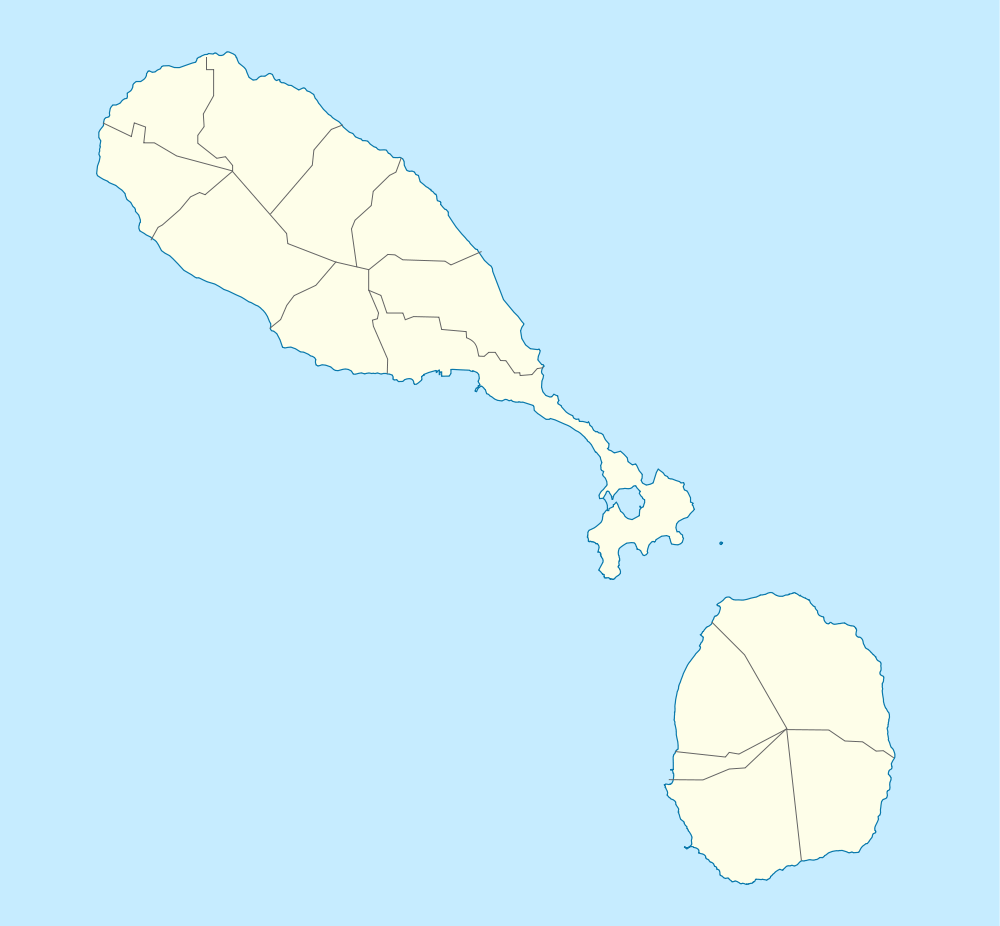Brimstone Hill Fortress National Park
| Brimstone Hill Fortress National Park | |
|---|---|
|
IUCN category II (national park) | |
|
View of the Prince of Wales Bastion at Brimstone Hill Fortress National Park | |
 Location in Saint Kitts and Nevis | |
| Location | Saint Kitts |
| Coordinates | 17°20′51″N 62°50′07″W / 17.3475°N 62.8354°WCoordinates: 17°20′51″N 62°50′07″W / 17.3475°N 62.8354°W |
| Established | 1987 |
| Type | Cultural |
| Criteria | iii, iv |
| Designated | 1999 (23rd session) |
| Reference no. | 910 |
| State Party | Saint Kitts and Nevis |
| Region | Latin America and the Caribbean |
Brimstone Hill Fortress National Park is a UNESCO World Heritage Site, a well-preserved fortress on a hill on the island of St. Kitts in the Federation of St. Christopher (St. Kitts) and Nevis in the Eastern Caribbean. It was designed by British military engineers, and was built and maintained by African slaves. It is one of the best preserved historical fortifications in the Americas.
The complex of fortifications were constructed on Brimstone Hill, a very steeply sloping hill situated close to the sea on the Western, Caribbean coast of St. Kitts. The word "Brimstone" means sulphur.
Early history
Cannon were first mounted on Brimstone Hill in 1690, when the British used them to recapture Fort Charles from the French. The French had not considered it possible to transport cannon up the steep and thickly wooded sides of Brimstone Hill. The construction of the fort then carried on intermittently for just over 100 years. In its heyday, the fort was known as 'The Gibraltar of the West Indies', in reference to its imposing steepness and height, its proximity to the sea, and its seeming invulnerability.

In 1782, the French, under Admiral Comte François Joseph Paul de Grasse laid siege to the fort. During the siege, the adjacent island of Nevis surrendered, and guns from Fort Charles and other small forts there were brought to St. Kitts for use against Brimstone Hill. British Admiral Hood could not dislodge de Grasse, and after a month of siege, the heavily outnumbered and cut-off British garrison surrendered. However, a year later, the Treaty of Paris (1783) restored St. Kitts and Brimstone Hill to British rule, along with the adjacent island of Nevis. Following these events, the British carried out a program to augment and strengthen the fortifications, and Brimstone Hill never again fell to an enemy force. The French navy tried to recapture the fort in 1806 but failed.[1]
The fort was abandoned by the British in 1853,[1] and the structures gradually started to decay through vandalism and natural processes.
20th century
Stabilization and restoration of the remaining structures of the fortress started in the early 1900s. In 1973, HRH Prince Charles reopened the first area to be completely restored, which was the Prince of Wales Bastion, shown here at the top of the article. In 1985, Britain's Queen Elizabeth II unveiled a plaque naming Brimstone Hill as a National Park. Legislation in 1987 officially declared Brimstone Hill to be a National Park, and it was declared a UNESCO World Heritage Site in 1999.
21st century
Areas that can be toured on Brimstone Hill include the imposing Fort George Citadel (which includes the Fort George Museum), the Western Place of Arms and the Eastern Place of Arms, all accessed via a steep walk up from the main parking area via a set of ramps and steps. Other areas include the Magazine Bastion, whose walls were breached by the French in 1782, ruins of the Royal Engineers' Quarters, ruins of the Artillery Officers' Quarters, Infantry Officers' Quarters, and the Orillon Bastion. The ruins of the barracks are a short walk from the car parking area.
References
- 1 2 Brimstone Hill Fortress. Sean Spurr. Caribbean.org.uk. Accessed 16 Oct 2012.
